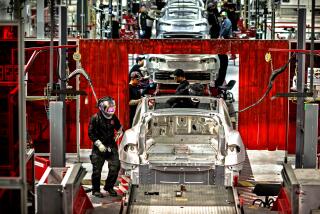Trade With China: Alluring, Agonizing
China wants to build better-quality computers. Odetics Inc. in Anaheim makes instruments used to test the reliability of computers and other electronics gear.
A good match between buyer and seller? Perhaps.
In the decade since China opened its doors to foreign investment, many American manufacturers have learned that breaking into the world’s largest consumer market is nice to dream about but somewhat difficult to accomplish.
Export restrictions, foreign exchange controls and cultural barriers are some of the stumbling blocks facing American high-technology companies trying to sell goods to China.
At a seminar Thursday in Newport Beach, representatives of high-tech companies in Orange County and elsewhere met with a high-level trade delegation from China. About 50 people attended the seminar, organized by the American Electronics Assn.
Odetics currently doesn’t export any products to China, but it is “trying to come up with a Chinese strategy,” said Jim Pope, an Odetics marketing director. “In our opinion, China is something we’re all going to have to watch out for. It’s definitely an economic impact that’s going to hit us toward the end of the century.”
Zak Kong, president of Network Software in Laguna Hills, believes that his company’s products are well-suited to the Chinese market. The firm specializes in computer software that enables computers at different locations to “talk” to one another.
“China has a very wide geography, and they take centralized control very seriously,” Kong said. “We’re in the business of computer-to-computer communication. We think . . . the potential is there. What we don’t understand is how to do business in China.”
Xie Gaojue, vice minister of China’s Ministry of Electronics Industry, said Chinese industry and consumers “are enthusiastic for American technologies and products.” He praised recent steps taken by the U.S. government to ease restrictions on high-tech exports but said U.S. trade with China is “still restricted within narrow limits and is at a low level and slow pace.”
Indeed, some company representatives complained that U.S. export controls have hampered their efforts to sell to China. “We could have made millions in China,” grumbled one executive from a San Leandro computer firm.
Robert L. Eckelmann, a U.S. Commerce Department official, acknowledged that export controls “have been a real problem for some of you (American companies).” He said the Reagan Administration plans to propose a further easing of export controls within the next few months, though he declined to elaborate on those plans.
Competing With Foreign Friends
The Chinese government favors looser controls on U.S. high-tech exports as it seeks to computerize its society and develop an electronics industry capable of exporting into the international market someday, Xie said. China needs to boost its exports to earn foreign currency to fuel its modernization program.
“We want to become the competitor of our foreign friends,” Xie said.
Japanese electronics companies have been more successful than their American counterparts in cracking the Chinese market. From 1981 through 1985, Japan captured a 60% share of China’s electronics imports, while U.S. suppliers had only 20%.
Xie attributed Japan’s success to several factors. “The Japanese are close neighbors of China, and they have a very good understanding of the way of doing business in China. The quality of Japan’s products are good. And they set a great premium on the low price of their products.”
Other speakers said the Japanese also have the patience and persistence necessary to be successful in China, where a multilayered government bureaucracy and red tape have frustrated many American businessman.
“If U.S. companies are interested in making a quick return on their investment in China, I’d advise them against going there,” said Emily Ou, who heads Chinese operations for Coopers & Lybrand, a New York-based accounting firm. “There is no such thing as a quick return in China.”






